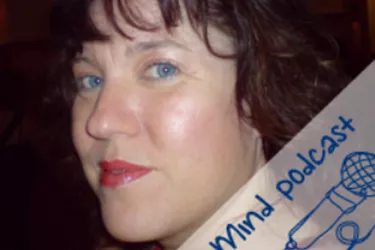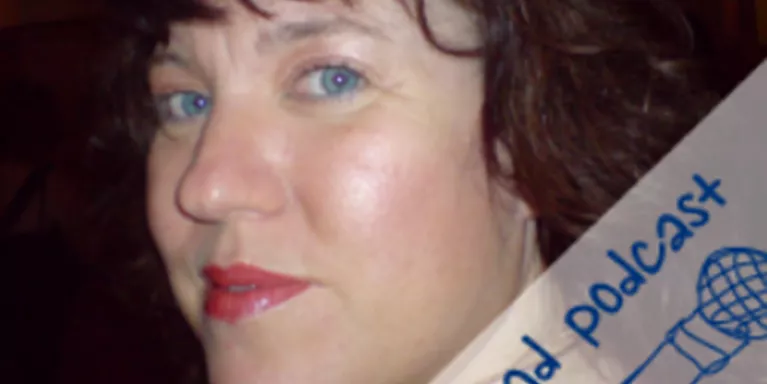Mind podcast - Anxiety and panic attacks
Gus talks to Heart FM DJ Matt Wilkinson about his experience of anxiety and panic attacks.
Subscribe to our podcast on iTunes or Audioboom.
For more info on some of the issues covered in this podcast, click below:
- Information on anxiety and panic attacks
- Talking therapies and how they can help with anxiety
- Information about the support you can get while studying
- How food can help you manage your mood
- How physical activity can affect your mood
- Advice on coming off medication
Welcome to the Mindcast. I’m Matt Wilkinson. Today, we’re looking at anxiety and panic attacks. Joining me is Gus Marshall, who’s from London.
Gus, how would you describe yourself?
I’d describe myself as a quite high achieving type of guy. I’ve got a job in private equity. In the past, I’ve run marathons all over the world. Ran the Marathon des Sables in 2004, which was about six marathons in five days, I think. So that, combined with my work; yes, I’m quite a driven type of person, really.
So why are you here today?
Well, I really wanted to share with the people out there how anxiety and panic attacks have impacted on my life and some of the things that I think I’ve realised with time, that I’ve learnt can really help me manage that anxiety and try and reduce the prevalence of some of those panic attacks.
Have you always been an anxious person?
Yes, I think I have always been relatively anxious but as far as the panic attacks actually go; the first one that I would describe as being a full panic attack didn’t happen until I was in my early 20’s. I’m nearly 40 now. So yes, there was always that underlying level of anxiety but it really didn’t manifest itself until I’d finished education, really and was branching out into the wider world, I suppose.
What’s the difference between being very anxious and having a full on panic attack?
Yes, that’s a good question. I think if I’m in a very anxious state, I can still function. I would describe the feeling as sweating lightly, probably, and having that pitted feeling in the stomach and feeling quite jumpy, dry throated, probably, and shallow voiced. But a panic attack is something else, completely. I can only describe it… Well, you’re certainly not or you don’t feel like you’re in control at all. So there’s no question of being able to operate or perform the way you’d like to. I can remember the last panic attack that I had and the symptoms were a vertigo type feeling, almost spinning head and tingling extremities. A shortness of breath. Much more pronounced, really physical sensations that are really panic worthy in their own right.
And what’s going through your mind at the time that happens? Is it a physical manifestation of panic which then causes you to be panicky or are you feeling that way in the first place and that makes you physically show the symptoms?
It’s more the manifestation, I think, in a way. You get these symptoms that you probably haven’t had before. Certainly, before I had my first panic attack, I’d never experienced them. So just the very nature of those symptoms; the racing heart, the feeling of vertigo and it sounds extreme but almost like being sucked into a vortex. It’s really out of control and if you’re quite a controlling person as well, then it’s doubly frightening but there is definitely that element of the panic feeding on itself.
Your heart starts to beat quicker. You start breathing less deeply and so you’re not getting as much oxygen into your system and that tends to exacerbate the problems. What you really need to do is try and take yourself out of the situation. Try and… It’s very difficult to talk yourself and calm yourself down because the physical symptoms are so powerful. But what you need to do is just try and step back and try, as a first stage, just regain your breathing and just regain the oxygen flow. It’s very difficult to do that when it’s happening.
Let’s go back to your first instance. This is just after university, right?
Yes.
What did it feel like when you first experienced a panic attack?
That one was the most frightening because I’d never experienced anything like that before. There was more of a reason there. I can understand the reason for the onset of the panic there. I was giving a presentation in front of my uni friends and it was one of the first presentations that I had given for a long, long time and there was an element there, of me feeling judged or under scrutiny that caused me… I could feel my levels of anxiety were high before I gave the presentation but once I actually started, it got out of control and I started to have a panic attack towards the end of the presentation. I actually had to stop giving it and that then led into all sorts of problems in other situations where I felt under scrutiny or in judgement. For example; job interviews which are a critical part of anyone’s life, immediately after university.
So after you had the first one when you were giving that presentation, you then had subsequent attacks when you were going for things like interviews as well.
I did, I did. They weren’t as severe but it was almost like a pathway had been formed in my brain. A neural pathway where when I felt under that scrutiny or judgement, that a similar thing started to happen. I must say, it wasn’t as extreme. It was somewhere in between a panic attack and anxiety but it caused physical symptoms like shaking, that obviously makes it difficult for you to present yourself in your best light when you’re being interviewed.
Did you seek help at that time, 15 years ago? Did you seek any medical help for what you were going through?
Yes, I did. I wish I’d sought some psychological help, cognitive style help but the symptoms were sufficient that I went to go and see my GP. He was very reluctant at the time, to put me on an SSRI but we tried beta blockers and it just wasn’t strong enough to prevent that anxiety from really coming through. So he trialled me on a drug which was quite new at the time which was called Seroxat. Also known as Paxil.
Okay, and an SSRI is a selective serotonin reuptake inhibitor. That’s what the acronym stands for.
Absolutely, yes. And what it does… I mean, it’s very effective but the analogy I use is it’s a bit like hammering in a nail with a sledgehammer. It takes away your anxiety but what it also takes away is a lot of your emotion, your ability to relate to other people. So it has quite a strong impact on your emotional relationships. Zombie is a bit strong a word but on the full dose, I was going through life on autopilot. And so in a sense, then, yes, you don’t have the anxiety but you’ve got a whole host of other problems to deal with which are your inability to really relate to people which creates its own host of issues.
And how long were you taking this medication for?
Well, I was taking the full dose for about six months and after that, I couldn’t cope with the side effects anymore. There are many, many side effects but on Paxil, at the dose I was on, which was the recommended dose, insomnia is one of them. I couldn’t sleep at all. That was probably the main one. So I reduced the dose down to about 10 mg which shouldn’t be a therapeutic dose but actually, I found that quite successful for me. It helped just to keep the anxiety and panic in check but allowed me to function enough to perform on a day to day basis.
So did that actually feel good, in a way? I know the side effects but knowing that the anxiety was no longer creeping into your life, did that make you feel good at all?
It really made me feel great and I think there’s a lot of negative press around SSRI’s and yes, the side effects were awful and yes, they blunted my feelings but one of the things that they did allow me to do, it gave me just a bit of space. The anxiety wasn’t there anymore. So it gave me space to react and take stock of things. Whereas when the anxiety was at full flow, you’re just in… You’re in a sort of panic mode. You can’t take enough of a time out to really try and view what’s going on, objectively and the SSRI’s allow you to do that because they put a break on the anxiety.
So how did it change your life? Other than the side effects. What happened to the professional Gus and the achieving things? What kind of stuff did you have to do?
Yes. After going on them, my life changed. I was debilitated by anxiety and it allowed me to get a job. I went and travelled over to Germany and got a job with a really good company over there. I was suddenly able to perform in the way that I know I can. It was like I’d been released and so, great things started to happen. I started to do myself justice, really.
Yes, and remind me; you were on them for six months, on the full dose and then you brought it down. So what was your total length of being…?
Well, I only came off them fully about two years ago.

Right.
So I had been on them, in one form or another for… Let me think. From 1995 to 2010. So 15 years.
Wow, and why did you decide to stop taking them? Was it your decision or was it a GP’s decision?
No. It was very much my decision, actually. I got married about three years ago and my wife is a naturopath and so she is very focused on using food and lifestyle as a method of bringing this issue under control, rather than mainstream medicine. So what we decided to do was to try and use nutritional regime and an exercise regime and just make various changes to my lifestyle to try and help me come off the SSRI’s. Coming off the SSRI’s is a story in itself.
Yes. What’s that transition like?
The transition, if done too quickly, can be really terrible. I think what is more and more commonly understood, certainly with Paxil is that you need to come off using a liquid form of it and literally, on a 1 mg by 1 mg basis. So I ended up coming down from 10 mg to zero, over the course of two years. What helped me phenomenally, was lifestyle changes. Just by taking some fairly simple steps, like drinking far more in moderation but I found the dietary aspects were actually much more powerful. Just eating foods that regulated sugar and just trying to eat a far more balanced diet. It may sound a bit silly, that, to someone out there who’s going through a panic attack but I can just adjust my diet and I’ll be fine. But if you have that as a backdrop, it’s certainly going to make your symptoms easier to manage.
Okay. So let’s take it to the moment, where you’ve taken two years, like you say, to transition away from taking SSRI’s, to being free of them. When you took your last dose, what did you feel about the future at that point? Did you think… Because, bear in mind, you’ve obviously not had an anxiety problem or a panic attack for 10, 15 years. So are you feeling really optimistic about the future or are you being quite cautious and wary about what will happen?
I think there’s an element of caution but I’m so optimistic. The challenge of that transition; of dealing with withdrawal effects every time you go down by 1 mg. Some people are just very sensitive to these things and so I’m amazingly optimistic that I’ve done it. That just feels like a bigger achievement than any of my Marathon des Sables or what I’ve done in work. It really does. I’m cautious, though, as well because I feel a bit like a safety net has been removed but what I do really feel now is that with the changes that I’ve made to my lifestyle, that I genuinely don’t think my panic attacks are going to come back.
So what happened, then, two years ago when you did have another attack? Your first since coming off the drugs, correct?
Yes. It was really terrifying, actually. I was on the way to a friend’s party. I was sitting in the back of a taxi on the way there and I suddenly felt really dizzy and my head started spinning. I started to feel a bit nauseous and with a cold sweat. You know how you get if you’ve got the flu or something like that? And I just felt really like I was standing on the edge of a really tall building. It was that type of vertigo feeling but I couldn’t understand why I was feeling like that because I was on the way to a really close friend’s party and it should have been a joyful event and really, one that caused me no anxiety at all. So I felt a bit ambushed by these physical symptoms and there was no real sign that they were coming and it was very, very frightening.
And how long did the whole thing last?
Well, the panic attack lasted for about 20 minutes before I had to get out of the taxi and tell my friends. I was travelling with two friends and one of them said to me, Gus, you’ve gone really quiet and I was hoping that it might be something that would just pass and then I could get on with the evening. But I had to get out of the taxi and I called my wife, who was away at the time. I said, I really, really need help. It was that extreme and I was kneeling on the pavement, clinging onto the railings and she ended up taking me to A&E, down at Chelsea and Westminster Hospital.
Is your wife your turn to person when you’re in a moment like that? How important is her role?
Yes, absolutely critical. I didn’t necessarily feel that my friends would really understand what I was going through and that was my assumption and perhaps, not a correct assumption but it felt more natural to go to my wife in the first instance. I felt… I don’t know. I just felt a bit embarrassed in a way, that I was having to miss out on a… It wasn’t just a party. It was actually the stag night of one of my best friends that I had to miss out on. So he was upset that I couldn’t make it and I somehow didn’t get the sense that they’d really understand what was going on. They’d say, oh Gus, have a beer. Don’t worry. Things will be alright and it wasn’t like that at all. It needed much more serious attention than that.
Were you tempted at that point, having had 15 years of no anxiety problems, you’ve had this one attack afterwards which has been really bad, by the sounds of it… Were you tempted at any point to go back on the medication or were you determined to stay off it, always?
Absolutely, I was itching to go back on it so much because I knew it would just solve the problem immediately but then I looked at it from another aspect and not being on it has just improved the quality of my relationship so much. I’ve just had a baby boy who’s now about nine weeks old.
Congratulations.
Thanks very much and when you’re on the Seroxat, yes it’s stopping you getting the panic attacks and it’s removing the background anxiety but it just stops you relating to people. It stops your capacity to really feel things and on that basis, that’s more important to me than suffering. Even though it was really bad, I’d rather have that quality of relationship and ability to feel and experience emotion than to have it blunted and so for that reason, I’ve decided to battle on and stay off them.
You were talking earlier about your ultra-marathon running, your six marathons in what was it? A week?
Yes, in five days, yes.
Is that just something that you, Gus Marshall, just like to do or is that related in any way, to your anxiety problems, or, perhaps, your medication you were taking?
I think it’s definitely related to anxiety. I mean, I’ve run a lot of other ultra-endurance events. The Marathon of Britain, the Amazon Jungle Marathon as well and you actually meet a lot of people on those ultra-distance running events that have had problems with anxiety in the past. I’ve done quite a lot of research on it, as you do when you’ve got an issue. You tend to dig around a lot on the internet and what you find is that you get an opiate rush as a long distance runner, that’s very, very similar to the serotonin but also, dopamine enhancing effect that you get from an SSRI. I do think a lot of that ultra-running… And I don’t do it so much anymore. I still like to run but not to such an extreme effect. I think a lot of that was self-medication.
It was a way of finding a focus and it was a way of me getting myself out of my own head and so yes, I like running but not to the extent that I want to run through the desert. I mean, it got up to 52 degrees one day and we were running a double marathon. So… And carrying all of our kit as well. So if I set off the day with a raw chicken in the back of my rucksack, it would have been cooked by the time I finished the race. So yes, I think running was a great tonic. It was a great medicine and I still run now, three or four times a week and I find that that helps to keep me on the straight and narrow. If I’m under pressure at work, it’s just like a pressure release valve, I find. It’s really helpful.
I’m just curious; doing two marathons in a day, firstly, why? I mean, what’s wrong with just doing one marathon? What’s wrong with just going for a run in the park?
I agree. I think I’m just a competitive person, competitive with myself. Ironically, one of the things that I’m learning and one of the things that’s helping to dissipate the panic is learning how not to be so competitive and competitive with yourself. I think that comes back to genetics and personality but why on earth did I do it? I look back on it now with, it feels like complete madness but it’s also something that I look back on with great pride. It’s a real war of attrition. We, on the long day, we did two marathons and I think I set off at nine in the morning and I arrived at camp that night at about nine in the evening, in the middle of a sandstorm in pitch dark. Yes, I mean I forget whole swathes of it. I think I was probably somewhere else for some of it.
And how have you been since your last panic attack, a couple of years ago? Have you had any others since then?
It depends. You have good days and bad days. When that safety blanket of the pills has been removed, there’s no rhyme nor reason sometimes. You can just wake up and just feel a bit shaky. I think it takes your body a long, long time. It takes the brain chemistry a long time to adjust when you’ve been on something as powerful as an SSRI for 15 years. You’ve really just got to take it one day at a time. Yes, there have been times where I’ve felt intensely anxious but I’ve been able to manage it somehow. I’ve got, as a base, I’ve got this better diet. I don’t really drink anymore. I don’t think that was really helping me at all and I just feel more able with these meditation tools and a lot of the cognitive therapy work that I’ve done. I’ve got enough tools to self-manage that I know I’ll be alright, even if I’m feeling really anxious.
Are panic attacks something that you feel will always be with you?
I think they’ll always be with me. Certainly the experience of them was so intense that it feels almost that it’s carved an indelible mark on my brain. It’s not something that you forget in a hurry. I think they’re always with you in a sense because however much you manage and you try and create a positive outlook, the fact is that it happened once and there’s always a chance, however minor, that it might happen again. And it might happen in a scenario where you really don’t want it to happen. So yes, they’ll very much always be with me. What I do feel, I feel an immense sense of achievement, having learnt how to bring them more under control, I think. And more than that, to do it without the safety blanket of the SSRI’s which I used for so many years.
Of course, and so that way of keeping it under control is less alcohol, or no alcohol, your diet, your fitness as well and your meditation. That’s all part of it, is it?
Absolutely, and I found the biggest factor, without a doubt was alcohol.
Tell me, nowadays, do you avoid anxiety provoking situations or do you find yourself deliberately not doing that because you don’t want to let a potential anxiety attack affect your life?
That’s really it. I sometimes actually actively seek out quite anxiety provoking situations. I didn’t do that immediately when I came off the SSRI’s. In fact, for about six months after, I felt very, very fragile and kept away from any anxiety provoking things. But as my confidence in myself and through these self-management techniques has improved, I’ve started to seek out more anxiety provoking things, really.
Is that to test yourself?
Yes, absolutely. And that might sound a bit strange but I think it’s a measure of my growing confidence in that I’ve moved on and evolved from where I was before.
And your competitive spirit, as well.
Yes, absolutely.
Gus, what advice would you give to other people? Someone listening now. Maybe they’ve just had their first panic attack. Maybe their best friend has. What would you tell them?
I was really, really scared when it first happened to me and I think the best piece of advice I can give is, yes, you might feel like really bad things are happening to you at the time but they will pass. They absolutely will pass. The longest one I ever had lasted for about two hours. It may feel awful but it will go away and I appreciate it’s a frightening thing. I would urge anyone to get some help. Go and talk to someone about it. It took me 10 years before I actually went and started speaking to a cognitive therapist because I somehow didn’t think it really would work or that just by talking to someone, it can make a difference and it really, really can just by verbalising those fears and talking about them with someone else.
Just one question for you; do you consider yourself to have a mental health problem or not?
That’s an interesting question. It’s funny. Do I feel like I have a mental health problem? I can almost feel the stigma attached to that and I don’t want to label myself with that but yes, I do have a mental health problem. I have situations where my anxiety becomes so intense that I can’t perform and I’ve had situations where I’ve had a panic attack where I’ve had to go to A&E. So yes, that is a mental health problem. It’s really interesting the way you asked that. I didn’t want to somehow admit that I had a mental health problem but I don’t have any issue with that. And it’s one of the reasons I’m here now and why I’m really willing to help anyone who’s going through the same type of thing because it’s a health problem in the same way that you might have a physical health problem. So it shouldn’t be treated any differently to that. So yes, I do have a mental health problem. It’s something that I manage and it’s something that can be managed.
Gus, thank you for joining me today.
Thanks very much.

Information and support
When you’re living with a mental health problem, or supporting someone who is, having access to the right information - about a condition, treatment options, or practical issues - is vital. Visit our information pages to find out more.
Share your story with others
Blogs and stories can show that people with mental health problems are cared about, understood and listened to. We can use it to challenge the status quo and change attitudes.















